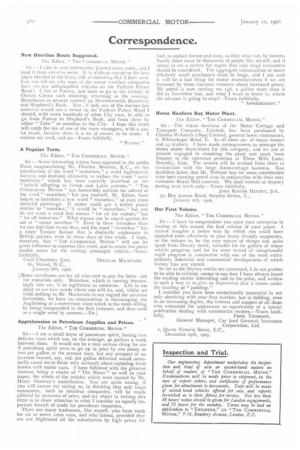A Popular Term.
Page 12

If you've noticed an error in this article please click here to report it so we can fix it.
The Editor, " THE COMMERCIAL MOTOR."
Sir :—Some interesting letters have appeared in the public Press congratulating Air. Fletcher Moulton, K.C., on his introduction of the word " motorism," a word legitimately formed, and destined ultimately to replace the word " automobilism," which has been correctly described as the " hybrid offspring of Greek and Latin parents." •' THE COMMERCIAL MOTOR " has favourably noticed the advent of the u ord " tnotorism," but you yourself, Mr. Editor, have helped to introduce a new word " motorbus," of even more doubtful parentage. If motor could get a dative plural similar to " omnibus," it would be " motoribus," but you do not want a word that means " for all the motors," but " for all motorists." What reason can be urged against the use of " motor omnibus "? Even in these strenuous days we can find time to say that, and the word " motorbus " has a nasty Yankee flavour that is distinctly unpleasant to British palates, even in these days of free trade. I hope, therefore, that " THE COMMERCIAL MOTOR " will use its great influence to suppress this word, and to retain the purer double name for the coming passenger vehicle.—Yours faithfully, Cecil Chambers East, DOUGLAS MACKENZIE. 86, Strand, W.C.,
January 8th, 106.
[Motor omnibuses are for all who care to pay the fares—not for motorists only. Motorbus, which is coming increasingly into use, is as legitimate as motorcar. Life is too short to use two words where one will do, and, whilst we yield nothing to Mr. Mackenzie in our regard for accurate derivation, we have no compunction in encouraging the Anglicising of a convenient word which is the more telling by being compounded in the first instance, and then used as a single word by consent—ED.]
















